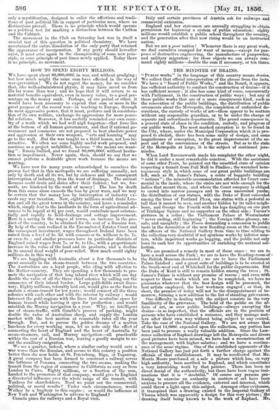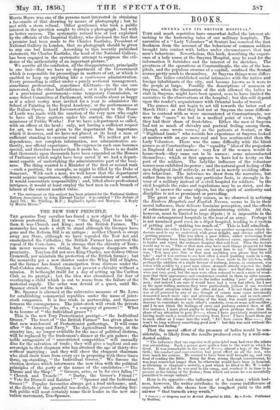THE MINISTER OF DRAINS.
" Puerile works" in the language of this country means drains. We collect that official interpretation of the phrase from the facts. We have a "Board of Public Works," and the Board, it appears, has sufficient authority to conduct the construction of drains—if it has sufficient money-; it also has some kind of voice, concurrently with Parliament, in the construction of public ways • but any of those public works that are of a more conspicuous kind, such as the renovation of the public buildings, the distribution of public ornaments about the Metropolis, the completion of unfinished del- corations, the custody of works of art---these appear to be matters withont any responsible guardian, or to be under the charge of separate and subordinate departments. The grand consequence is, a general state of chaos in the condition, oustody, and progress of our public works. The most marked exception is to be found. in the City, where' under the Municipal Corporation which it is pro. posed to abolish, there has been some unity of design, and some magnificence of conception, to the great improvement of the as peet and of the convenience of the streets. But as to the state of the Metropolis at large, it is the subject of continued jere- miades.
When Lord Itavensworth made his complaint the other night, he did it under a most remarkable sanction. With the assistance of some other Peers, he pointed out the unsettled state of opinion respecting a transit from Pall Mall to Pimlico; the wretched hete- rogeneous style in which some of our great public buildings am left, such as St James's Palace, a cent° of beggarly building " notions" • the miserable accommodation afforded Au Court cere- monial in the inside, where the stairs are not wide enough for the ladies that mount them, and where the Court company is old'
to crowd into narrow passages and In cross uncovered y the distribution of our statues, with the Duke of Kent concealed among the trees of Portland Piece, one statue with a pedestal so tall that it cannot be seen and another hidden by its taller neigh- bour, and George the Fourth with his legs dangling on one part of Trafalgar Square and no supporter on the other side ; Turner's pictures in a cellar ; the Parliament Palace at Westminster
never ending, still beginning " ; the Foreign Office gloomy, tui- safe, and unsightly ; the Times demanding a concession to public taste in the decoration of the new Reading-room at the Museum ; the officers of the National Gallery from time to time adding to the collection very doubtful if not spurious works by inferior mas- ters, while important works go begging, and the public not only loses its cash but its opportunities of enriching the national col- lection.
We are promised a remedy in most of these cases : we are to have a road across the Park ; we are to have the Reading-room of • the British Museum decorated ; we are to have the Parliament Palace finished;, and a great suite of buildings is to be erected. at the South-west end of Whitehall for the public departments. But the Duke of Kent is still to remain hidden among the trees ; St. James's Palace is without any promise of rescue ; and even with respect to those works which are to be completed, we have no guarantee whatever that the best design will be procured, the best artists employed, the best workmen engaged ; or that, in short, the promise of today will not be the disappointment of to- morrow, forming a new addition to the list of standing grievances. One difficulty in dealing with the subject consists in the very familiarity of the grievance. The hold of the public on the af- fairs of art, or over public buildings—always excepting the drains—is so imperfect, that the officials are in the position of persons who have established a nuisance, and they manage mat- ters after their own way without being subject to any control. Take the case of the National Gallery. We are not aware that of the last 14,0001. expended upon. the collection, any portion has been paid to procure a really valuable addition. Since the Law- rence collection of Raphael drawings left the Metropolis and divers good pictures have been missed, we have had a reconstruction ef the management, with higher salaries ; and we have a continu- ance of the same regime. One of the established opponents of the National Gallery has just put forth a further charge against 'the officials of that establishment. It may be recollected that Mr. Morris Moore purchased at a sale a picture which has, on very high authority, been ascribed to Raphael, and which constitutes a very interesting work by that painter. There has been no direct denial of the authenticity, but there have been vague insi- nuations that it is "doubtful." Of course any persons pro- fessing to exercise an authority in matters of art have been anxious to procure all the evidence, external and internal, which could throw a light upon this subject. Amongst other evidences, it transpired that a drawing existed in the Imperial Gallery at Vienna which was apparently a design for this very picture ; the drawing itself being known to be the work of Raphael. Mr. Morris Moore was one of the persons most interested in obtaining a fac-simile of that drawing by means of photography ; but he met with a stern refusal. Other gentlemen who took a public interest in the question sought to obtain a photograph ; but with no better success. The systematic refusal was at last explained by the officials of the Imperial Gallery, who disclosed the fact that a promise had been made to Sir Charles Eastlake, President of National Gallery in London, that no photograph should be given to any one but himself. According to this recently published statement, Sir Charles Eastlake, the head of the National Gallery, has been engaged in the systematic attempt to suppress the evi- dence of the authenticity of an important picture. We ascribe all the confusion, all the disappointment, principally to one fact—that we have no department of the Government which is responsible for proceedings in matters of art, or which is enabled to keep up anything like a continuous administration. Every proceeding is either 'under a purely sectional management, sometimes professional, sometimes dilettante—in the one case interested, in the other half-informed ; or it is placed in charge of a provisional government—some temporary Conamission, or some Select Committee of Parliament, with results about as happy as if a select vestry were invited for a year to administer the School of Painting in the Royal Academy, or the performances at the Italian Opera. Lord Ravensworth's complaint to the House of Lords was made with the sanction of the very man who ought to have all these matters under his control, the Chief Com- missioner of Public Works!. For we have a department so called, with an officer at the head ; only, not having a sufficient respect for art, we have not given to the department the importance which it deserves, and we have not placed at its head a man of sufficient standing to exercise real control. We neither get in- dependence, nor complete information, nor administrative au- thority, nor official experience. The expense in each case becomes special, and therefore heavier than it needs be. There is no doubt that thousands upon thousands have been expended on the Houses of Parliament which might have been saved if we had a depart- ment capable of undertaking the administrative part of the busi- ness. The thing wanted is a Minister of the first or second rank —such a position, for example, as might be ffiled by the Mike of Somerset. With such a man, we well know that the department would acquire importance, efficiency, and consistency of conduct. It would concentrate responsibility; and, lifted above professional intrigues' it would at least employ the best men in each branch of labour at the current market value.
* The statement on this subject has been printed for the National Gallery Reform Association by John Edward,Taylor : it is entitled "The Debate of April 7th ;- Mr. Stirling, MY.; Raphael's Apollo and Marsyas. A Reply by Morris Moore."



























 Previous page
Previous page